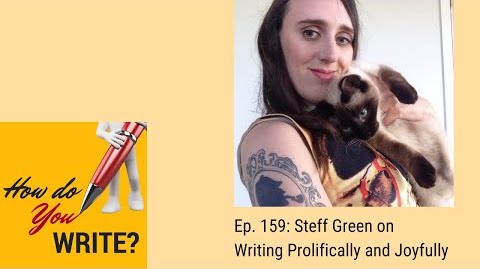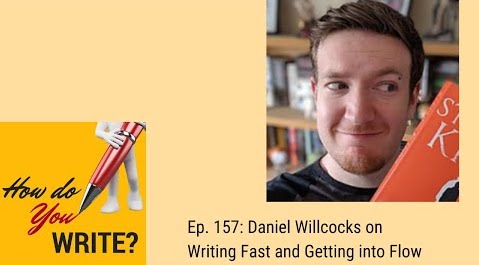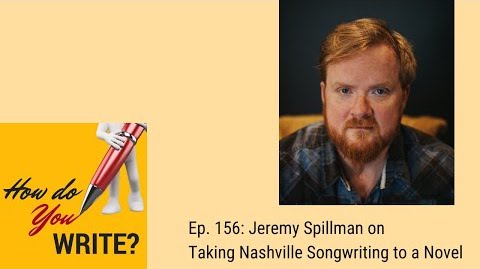Rachael shares her personal opinions on what happened with the RWA implosion, and what has to happen next.
Mentioned: https://twitter.com/RomancingNope/status/1211025913128902657
Transcript
Rachael Herron: Welcome to “How do you Write?” I’m your host, Rachael Herron, and this is a bonus episode brought to you directly by my $5 Patreons. If you’d like me to be your mini coach for less than a large mocha Frappuccino, you can join too at www.patreon.com/rachael
Well, hello writers. Welcome to episode number 161 of, “How do you Write?” I’m Rachael Herron. This is a bonus mini episode, and this is being recorded on the last day of the decade, December 31st, 2020 and I am coming to you on this day because, the first episode of the year, I always do my yearly Roundup of what I made, and I just do not have the time to do that. So I want to get this, um, podcast out.
I will not get the yearly Roundup out until next week because tomorrow on the first, I am going away for eight days to Seton Hill, which is a fantastic master’s program in commercial fiction, and I’m going to be teaching there. So that’s going to be wonderful. But I won’t have time to do that podcast for a little while.
So I wanted to hold you over with this mini podcast in which I normally answer patreons’ questions. I’ve got some patreons questions, they’re all queued up, but much more important for me today is to talk about the romance writers of America implosion. And I wanted to tell you how I feel about it if you were involved at all, um, and you listened to me, there are, there’s a great chance that you already feel like me. If you have seen reference to this RWA debacle online, uh, you might be aware of it also. But what it means to me, is this: romance writers of America is the organization to whom I credit my success in many, many ways. I learned more from being with them for the first two years of my writing career, then I did get my master’s degree about the business and the craft of writing. Um, it’s mostly women, there are some men, but the people in that community know absolutely everything about writing. They really do. They’re 95% of them, I swear to God, are lawyers. They, uh, know from the top to the bottom what the publishing industry looked like.
When I came in to RWA, it was, we were still mostly in the traditional world. In fact, there were no people self-publishing at that point, except, you know. You know, your uncle, um, that guy was still self-publishing, but back then it was not a viable time to do that this – I came in in 2008. It was just starting, I believe the, uh, Kindle came out that year, so yeah. This was just on the horizon. And in that, in the last 11 years that I’ve been with the organization, um, RWA was pretty standoffish towards self-publishing for a while, and then it realized, oh, yes, of course, this is the way of the future. So now it balances both, um, my best friends in the world, literally have come from RWA. I don’t even write romance anymore, and you know me. I talk really passionately about this organization and how it can help people. I’m active in the organization. I’m on our local board of the San Francisco, uh, area, RWA. Everything I’m going to say on this show is not said from a position of me being on the board. It is me speaking as a writer independently of what our board says or thinks, uh, what happened was, I’m going to try to nutshell it as much as I can. Um, there is a, an awesome writer named Courtney Milan who, um, said something disparaging about another writer’s older book, I think came out sometime in the 90s. She called it a big racist mess. Um, a fucking racist mess.
I think that was what it was. The writer in question, and an editor sent a letter of complaint to the ethics committee at RWA. RWA at that point, I believe, should have looked at the complaint and said, well, what the, Courtney didn’t violate any of these things that they’re saying she violated, except perhaps the one that says, we should be friendly and get along with everybody. And, uh, my belief is it shouldn’t have been read that way. One is allowed in one social media, always to say what one wants. RWA doesn’t police that, or at least they never have up until now. Um, so they, Courtney Milan as an anti-racist activist has done amazing things for RWA. She has worked at the national level, uh, she was the head of the ethics committee. Instead of asking her to recuse herself, they called her and asked her to resign. Uh, which she did so that they could have a conversation over this ethics complaint. They then did not use anybody on the standing ethics committee. They did not tell them there was going to be a new ethics inquiry. They appointed a secret ethics committee, uh, and heard this complaint, that ethics committee recommended to the RWA national board that Courtney, uh, be suspended from RWA for a year, uh, be censured and, um, not issue that she not be able to hold any position of leadership, uh, for the rest of her life in RWA.
This was a terrible thing to do. Uh, but it was voted in by the board. It was 10 to 5 with one abstention, and Courtney was alerted to the fact that she was no longer, she was suspended. She could not act in a supervisor committee, um, position of any kind. And this was spilled on Twitter. Uh, there was no secrecy around it. Courtney had already asked if she could talk about it. Um. And it was, uh, brought to light on December 23rd, and the entire internet basically blew up. It erupted. Everyone has talked about it, the New York times, Nora. Um, it’s literally everywhere. People have been telling me about it. I am actually, I’ve been off of all social media except the Instagram for probably six or eight months, much happier for it. Um, but my wife told me that morning, she says, I think there’s something really bad happening in RWA. And I said, poopoo, whatever, or something, I’m sure there’s something that it can’t be that bad. And I looked and I was like, oh, this is that bad. I do not think that anything they did was right about this. Basically what they did was they said with this decision that they are protecting the feelings of nice white women, and if you speak out against racism in any way, you are then ejected from RWA. So the marginalized writer is not safe, the nice white lady is safe. That has been a problem with RWA forever.
Um, and apparently it, they’re doubling down on it. They’re not doubling down on it. They are quadrupling. They are hundred times-ing down on it. Uh, I am a member of San Francisco area, RWA, we were one of 30 of the 115, I believe, RWA groups that called immediately for the, um, resignation of the president, the president-elect, and the executive director. The president who’s actually in our chapter and is an active anti-racist. Um, she does a great job with diversity, equity and inclusion. However, she was the figurehead at the helm, and she stepped down immediately because that’s what anybody in their sane right mind would do in this position. Um, basically when this level of racism has risen to the top, it’s time to kind of start over. You have to get rid of those people. Uh. What I didn’t say was that that decision was immediate, that the decision that they made about Courtney was immediately rescinded later that day, as RWA said at first, that there was a gap between practice and policy. Later, days later, they officially said that actually what they did was they rescinded the decision about Courtney and reinstated all her rights, uh, as a response to the, as they called it, the backlash, not the reaction, but they call it the backlash.
Um. It just makes me so angry. It makes me so angry that my little fist clench. So anyway, uh, president-elect became president. It is Damon Suede. Um, I personally have never met Damon Suede, I’ve heard him on lots of podcasts. I actually voted for him for president elect. Uh, I thought having a gay man on the roaster would be awesome. Uh, it turns out he’s a cretin and a creep and lies a lot. There are so many things you can read, but what I’ll do is hover at www.howdoyouwrite.net. I’ll put the link of a blogger who’s been keeping track of everything as it goes. So if you really want to get deep in the tea on this, you can go to that link and look at everything. Um, read all the things that Damon Suede has or hasn’t done, has or hasn’t said, um, with, with proof over there. So that, that is something interesting to read. He’s not a nice guy and he’s refusing to step down. So the organization, is imploding even more on the day that this happened, uh, the eight authors of color who were on the board, we had finally gotten an incredibly wonderful, diverse, inclusive national board.
Those women stepped down. They said, we do not feel safe in this organization anymore. They stepped down. And so we are left with, yesterday we had, um, three people. We had the president elect the treasurer, I believe and the executive director, and three remaining board members. That is six leading this national organization. They all need to go. In my opinion, all of them need to go. We need to, the only way that I think RWA could rise from the dead, um, is it, it became an organization that is actively hostile to people who create an unsafe environment for their marginalized members. We cannot be a place that provides a safe and respectful environment to racists period. Uh, so I am to the point where if I’m, I have said to my board president and to people around me that if Damon Suede doesn’t go, if we do not start from the ground up, um, I’m out of the organization, which absolutely breaks my heart. RWA has been everything. I have loved it so much. I am so heartbroken and I’m so angry that this has happened, that this has gone this far. So I know I’m, I’m barely marginalized. I’m a sis white woman who happens to be gay. Um, my troubles ain’t nothing like the authors of color and what they face and the fact that we have now made them feel even more unsafe in a place that already felt unsafe to them for historical reasons, uh, is absolute bullshit. So I am furious. I will not be a part of an organization like that. Um, today, instead of hearing that Damon and Carol Ritter, the executive director stepped down. Instead, we heard that they, um, put in board members. These of course, are not elected at this point, and our by-laws say that the president elect can appoint them in case of this kind of emergency. So he is now appointed people who other people are speculating are his people. He is known to do that. Uh, so there, uh, those, there are four new members that way I cannot imagine it would say yes to him who would want to step in in this time. Um, I said something really crappy yesterday that, you know, in the, in these ashes, we will rise a truly inclusive board and the entire internet said you had one.
They all quit because of what happened. So, I do encourage you to do your own reading, your own digging. This is not, and what I don’t want you to do is saying, oh, the romance writers, those ladies, they’re up to some catty stuff. No, this is absolutely the biggest trade organization in publishing. These are the women who run publishing. They sell the most books out of any other genre in the world. Uh, RWA is a $3 million organization who has a lot of money to do a lot of things with. And as chapters, if they decide to disaffiliate, um, they’re one we’re all wondering if we disaffiliate do we have to send you all our money, our prudent reserve, um, of our members’ money.
So there’s all this, there’s so much talk. So much speculation, so much panic and so much anger. And I just really wanted to be very clear on where I stand. I stand for Courtney. Um, it was a racist cluster fuck, that should never have happened. The ethics committee has been passed many racially charged complaints, most of which have never, well, I am exaggerating, some of which have never risen past the, the office staff. Uh, this one about Courtney seems to have been a malicious attempt at a coup. I know it sounds like a lot, but the more you read, oh, um, and it’s not acceptable. And I’m devastated. And that is my position. That is my personal position. So that’s where I am.
That is not the most cheerful update on the last day of the year, but for, for a really cheerful update, I will tell you that I ran my numbers yesterday and this year I made $158,000 hot damn, almost $159,000 hot damn. So I will be on the next episode, breaking down what I made, how I made it, what it feels like, how much of that is write offs, if I can, if I can guess toward that. Um, I always really enjoy doing that show. So that will be coming up next. But honestly it might be nine or 10 days. I just don’t think I’m going to have time with all my travel to get that episode out by next week. So, I will keep you posted. It will be the very first episode of the new decade though. So I just wanted to say a big thanks to you for being here with me at “How do you Write?” for this past year or years, if you’ve been around a while, it means the world to me, and thanks for listening to me talk about RWA. I think it is really important and relevant to anyone who is in the writing industry at this time. To know that not only the bad actors are still there, they’re still trying to do it the way they’ve always done it, and there’s a lot of people fighting for that not to be allowed. And I am on the side of not allowing systemic racism to stand inside our industry.
So I hope you feel the same way and I wish you a very Happy New Year. I hope that wherever you are, if you’re celebrating tonight, um, you’re fine, and you’re safe and I look forward to writing with you in the new decade to come, which for me, as I record this is in like three and a half hours, I think. I don’t know what time it is. Anyway, Happy New Year to all of you and thank you again so much.
Thanks so much for joining me on this episode of “How do you Write?” You can reach me on Twitter, twitter.com/RachaelHerron, or at my website, www.rachaelherron.com, you can also support me on Patreon and get essays on living your creative life for as little as a buck an essay at www.patreon.com/rachael spelled R, A, C, H, A, E, L and do sign up for my free weekly newsletter of encouragement to writers rachaelherron.com/write/
Now, go to your desk and create your own process and get to writing my friends.


